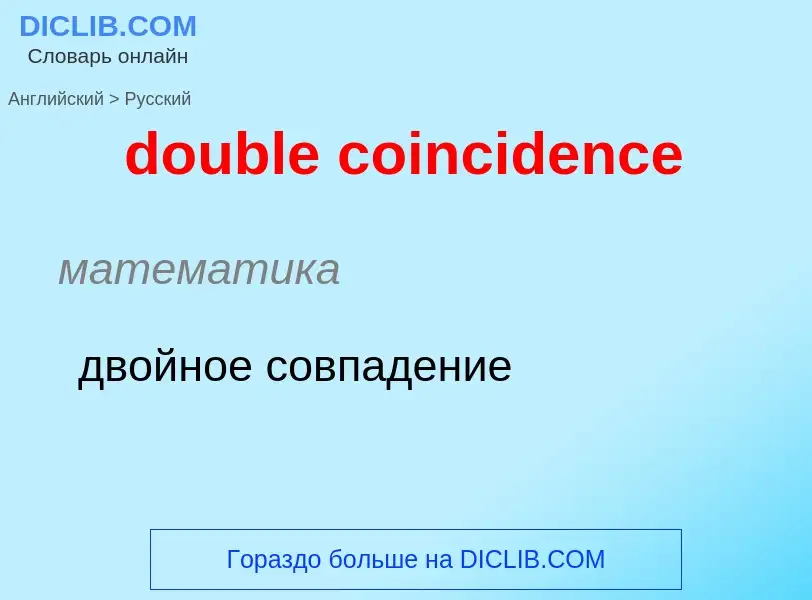Перевод и анализ слов искусственным интеллектом ChatGPT
На этой странице Вы можете получить подробный анализ слова или словосочетания, произведенный с помощью лучшей на сегодняшний день технологии искусственного интеллекта:
- как употребляется слово
- частота употребления
- используется оно чаще в устной или письменной речи
- варианты перевода слова
- примеры употребления (несколько фраз с переводом)
- этимология
double coincidence - перевод на русский
математика
двойное совпадение
математика
индекс совпадения
[kəu'insid(ə)ns]
общая лексика
совпадение во времени, одновременность, синхронность
случайное стечение обстоятельств
совмещение
совпадение
согласование
одновременность
синхронность
Смотрите также
существительное
общая лексика
совпадение
случайное стечение обстоятельств
полное согласие
гармония
Определение
Википедия
The coincidence of wants (often known as double coincidence of wants) is an economic phenomenon where two parties each hold an item that the other wants, so they exchange these items directly without any monetary medium. Within economics, this has often been presented as the foundation of a bartering economy. However, ethnographic research has not corroborated that this model of barter exists in reality.
In principle, double coincidence of wants would mean that both parties must agree to sell and buy each commodity. Under this system, problems arise through the improbability of the wants, needs, or events that cause or motivate a transaction occurring at the same time and the same place. One example is the bar musician who is "paid" with liquor or food, items which his landlord will not accept as rent payment, when the musician would rather have a month's shelter. If, instead, the musician's landlord were to throw a party and desire music for it, hiring the musician to play it by offering the month's rent in exchange, a coincidence of wants would exist.
In-kind transactions have several limitations as it only effectively works if one party actually has the item, or is willing to make said item, that the other party is seeking. Having a monetary medium can resolve this issue as it provides freedom for the former to work on or give away other items of interest, instead of being burdened to provide a particular item to the latter, impeding innovation in the long term, especially if barter was implemented on a larger scale. They can also only focus on satisfying parties that have monetary medium. Meanwhile, the latter party can use their medium of wage to wait and see which party would provide them the item they want.
Besides barter, other kinds of in-kind transactions also suffer from the coincidence of wants problem in the absence of a medium of exchange. Romance, for example often relies on a double coincidence of wants. If Max likes Mallory but Mallory does not like Max, then the two cannot meaningfully exchange the benefits of romance. Only if there exists a coincidence of wants can a mutually beneficial relationship be established without a medium of exchange.
John Hickman argues that barter may characterize future interplanetary trade because the much lower costs of communication compared with transportation will make a shared currency between the economies of the two worlds impossible.
As another example, when wealth is transferred during marriage, divorce, inheritance, and other crucial life events, or during the collection of taxes or tribute, it is improbable that this event will coincide with the recipient's desire for the commodities the payer can readily obtain. All of these transactions entail an improbable coincidence of wants and events which can be resolved by the existence of a monetary medium.

![cars]], parked side by side cars]], parked side by side](https://commons.wikimedia.org/wiki/Special:FilePath/Red cars parking.jpg?width=200)
